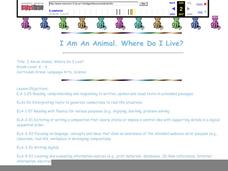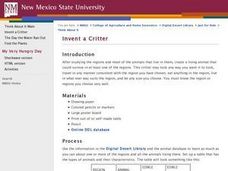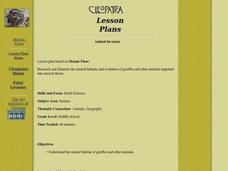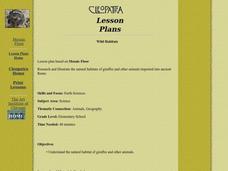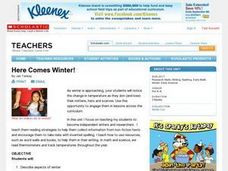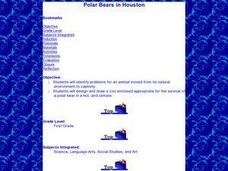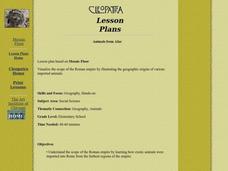Alabama Learning Exchange
Zoo Animals
Students identify different types of animals and their habitats. They compare natural habitats to habitats. They use Internet resources to gather information on animals.
Curated OER
Visit The Virtual Zoo!
Students observe animals in zoo habitats. In this life science activity, students access the Internet and visit zoo websites in order to virtually observe animals. Students record their observations.
Curated OER
Species Charades
Students identify endangered species. In this endangered species lesson plan, the teacher leads a discussion about endangered species, then the class plays a game of charades to pantomime animal behavior.
Curated OER
The Invisible Zoo
Students differentiate cold and warm-blooded animals using infrared images. In this physics lesson, students compare the images formed by infrared and visible light. They explain how scientists use infrared technology to study animals.
Curated OER
I Am An Animal: Where Do I Live?
Students make an alphabet booklet using the computer to find pictures and facts about farm animals, zoo animals and pets. They write facts about the animals: where they live, what they eat, their coloring, etc.
Curated OER
Citizens For the New Zoo
Third graders complete Internet research to find information about an animal and its basic needs. They design a model of a zoo habitat that would accommodate their animal. They write a letter of recommendation to a Zoo board of directors...
Curated OER
Invent a Critter
Students create a living animal that could survive in at least one specific region and use the digital desert library to gather information. In this invent a critter lesson plan, students draw a picture of their animal, describe their...
Curated OER
Close to Home
Fourth graders examine habitats for animals by creating their own in class environment. In this environment lesson, 4th graders research the Internet for information on certain wild animals and the places in which they live. Students...
Curated OER
Animals: Here and Now
Discuss and identify natural habitats of animals commonly found in zoos. The class constructs and displays small "zoo like" models to show a chosen animal habitat. They write a short story or diary about an animal or pet of their choice....
Curated OER
Paper Bag Zoo
Students create animals that might be found in a zoo using paper bags, construction paper, and other materials. They present their animal to the class stating any facts that they may know about the animal and its habitat.
Curated OER
Animal Invasion
Middle schoolers research and illustrate the natural habitats and evolution of giraffes and other animals imported into ancient Rome. They draw a map of Europe, North Africa, and West Asia and draw the animals from each region in their...
Curated OER
Wild Habitats
Students research and Illustrate the natural habitats of giraffes and other animals imported into ancient Rome. They draw a map of Europe, North Africa, and West Asia and draw the animals that come from each region in their proper places.
Curated OER
Here Comes Winter!
Students investigate winter behaviors in animals. They describe winter and write about the characteristics of the season by drawing and labeling a winter picture. Students then conduct research on a chosen animal and create a chart. ...
Curated OER
Animal Characteristics
Students investigate the characteristics of animals by creating a chart. In this animal life lesson, students create a KWL chart listing all the different animals a class can name. Students take a field trip to a science facility to get...
Curated OER
Polar Bear Needs a Home!
Third graders are introduced to the topic of habitat . They create a zoo exhibit fo a polar bear that is being donated to the Albuquerque Zoo. The zoo is not big enough for a brand new cage, so the students choose which of three...
Curated OER
Deserts: How Do You Define One?
Second graders identify what constitutes as a desert by reading a habitat checklist. In this environment lesson plan, 2nd graders read a nature website to discover facts about the desert and where they are located. Students utilize art...
Curated OER
What Do Koalas Need to Survive?
First graders take a field trip and examine the Koala and his habitat. In this Koala lesson, 1st graders read Possum Magic and discuss the foods of Australia. Students view the habitat of a Koala and record what it eats, its physical...
Curated OER
Technology Integration Lesson Plan: Internet
Seventh graders describe an endangered animal's environment and their habitat. They compare the habitat the animal came from vs. the one that exists today, in a Venn Diagram. Graphically, the student illustrates a proposed program to...
Curated OER
Polar Bears in Houston
First graders read a book about animal babies from the Arctic and discuss what a polar bear needs to survive. They design a suitable zoo habitat for a polar bear using crayons and paper.
Curated OER
It's A Zoo!
In this noun and article instructional activity, students review and identify nouns and articles in sentences. In this underline and short answer instructional activity, students answer eleven questions.
Curated OER
Animals from Afar
Pupils visualize the scope of the Roman empire by illustrating the geographic origins of various imported animals. They study how exotic animals were imported into Rome from the farthest regions of the empire.
Curated OER
Animals of Madagascar
Students are each assigned an animal from Madagascar. They research their animal and design a picture book about their animal. Students design a cover page, back page, bibliography page and the title page. Their book will contain...
Curated OER
Saving Big Cats from Extinction
Students explore extinction. In this biology and environmental science lesson, students define extinction, identify what living things need to survive, and create a persuasive poster about "saving the big cats" using a desktop...
American Museum of Natural History
Going, Going...Gone?
Young environmentalists consider how scientists are attempting to save endangered species. They read about what causes extinction and steps to take to minimize the threats.






